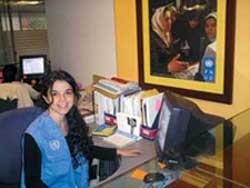Post Date: September 27, 2005
The following story is from the September 2005 issue of Harvard Law Today.
This summer, while some classmates in New York and Boston drafted briefs or finalized memos in high-rise office buildings, the 28 Harvard Law students selected as 2005 Chayes Fellows encountered entirely different challenges.
Mary Weld ’07, working in Sudan, had to brush off her computer every few minutes during the dust storm that blanketed Khartoum for four days. Alexandra Chirinos ’07, working in Colombia, had a neighbor who threw furniture from his window onto the street below. Devin Brennan ’07, in Hungary, could barely read the menus in local restaurants.

Since 2000, Chayes Fellowships have offered a handful of HLS students funding for summer internships in international political and economic development. Recipients have worked for organizations ranging from Chinese local courts to U.N. peacekeeping operations, from Washington, D.C. to Tajikistan. This year, the program, which honors the memory of Professor Abram Chayes ’49, sent fellows to 14 countries to get a ground-level view of international law.
While many students worked in human rights with organizations like the U.N., the program encourages students to explore a range of areas of international law and development issues. Brennan worked for an NGO dedicated to biodiversity and found that environmental problems inherently raise international legal questions.
“You wouldn’t think that a kangaroo rat that’s roaming somewhere in California could impact … an entire species elsewhere,” he explained, “until you see the science.” His summer internship involved writing a paper about strategies for NGOs to help coordinate national policies to protect the environment.
Chirinos found that bringing about change–much less multinational cooperation–within one nation can be an enormous challenge. Working with the U.N. Development Program in Bogotá, she interviewed NGO workers about Colombia’s new laws for advancing the peace process with rebel forces.
Many of her interview subjects were skeptical about the potential of the laws. “The books have all these great laws about socioeconomic rights and about the right to justice and the right to truth,” she said. But on-the-ground realities are often extremely different.
“That’s the hardest part to realize as a law student. … A lot of the policies are really toothless when there’s a really strong political environment that dictates the way the laws will be applied.”
She watched military police question the man who threw furniture from his window. The man gave them money, and they left, she explains–but only after they took the valuable pieces of furniture with them.
“There’s no better field experience than actually living in a place where the police have their own idea of what the law should be,” she said.
While Chirinos observed gaps between a legal system and its implementation, Gabriel Kuris ’07, who worked in Phnom Penh with the Documentation Center of Cambodia, found that even a poorly implemented system is better than no system at all.
He helped design training workshops for government officials and the media about upcoming trials of Khmer Rouge leaders. He watched a trial in a local courthouse, a building he compared to a country store, “surrounded by cows and chickens and overgrown weeds.”
“The defense counsel were either talking on cell phones the whole time, or they didn’t talk at all,” he recalled. “One of them didn’t show up at all. It’s just so different from things you take for granted in America.”
The Khmer Rouge’s purges wiped out all but a handful of judges and attorneys, so after the regime was toppled, the country lacked resources and expertise to rebuild its legal system, Kuris says. But he found that many Cambodians are eager for change.”
When he asked a Cambodian co-worker who had spent time studying at Rutgers University what the co-worker missed most about the U.S., Kuris was surprised at the man’s response.
“I was expecting him to say hamburgers or movies or something,” Kuris said. Instead, the man answered: “The rule of law.”
Chayes Fellows reported experiences that were sometimes frustrating, sometimes exhilarating. But Weld, Chirinos, Kuris and Brennan all said they had gained an appreciation of the challenges of practicing international law.
As Chirinos explained from her office in Colombia, “I now realize that I’ll get a law degree, and that’s where my work will start.”
– By Mary Bridges